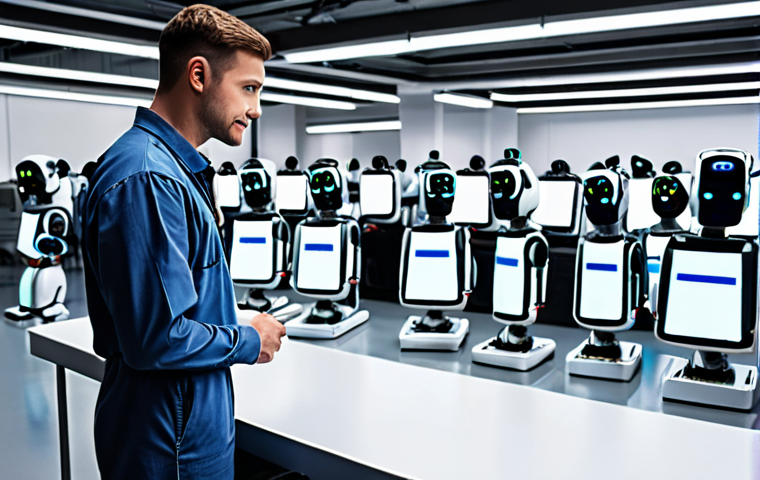The rise of artificial intelligence presents both incredible opportunities and profound ethical challenges. As AI systems become increasingly integrated into our daily lives, impacting everything from healthcare to finance, it’s crucial to ensure their development and deployment align with human values.
Neglecting the ethical dimensions of AI could lead to biased algorithms, privacy violations, and even job displacement, ultimately undermining public trust.
It’s up to us to educate ourselves and others about these concerns and work towards a future where AI benefits all of humanity. Let’s dive deeper into this topic in the article below!
Navigating the AI Ethics Maze: A User’s Guide to Staying SaneAlright, let’s be real – the whole AI thing can feel like wandering through a funhouse made of mirrors and existential dread.
One minute you’re marveling at the tech, the next you’re wondering if your Roomba is plotting your demise. To keep our heads above water, we’ve got to tackle the ethical questions head-on.
So, let’s break it down, shall we?
The Algorithmic Bias Boogeyman: Why Your Data Matters

So, algorithmic bias is basically when AI systems make unfair or discriminatory decisions because of the data they’re trained on. Think of it like teaching a kid only one side of a story – they’ll only ever see that perspective.
In the AI world, biased data leads to biased outcomes, which can seriously screw things up.
Data Diversity is Your Friend
If your training data is all from one demographic, guess what? The AI is going to be great at serving *that* demographic, and terrible for everyone else.
It’s like teaching a self-driving car to only recognize white people – not a good look, and potentially dangerous. You need data from all walks of life to make sure your AI is fair and inclusive.
Spotting Bias in the Wild
So, how do you know if an AI is biased? It’s not always obvious, but there are a few red flags. For example, if a facial recognition system consistently misidentifies people of color, that’s a pretty clear sign.
Or, if an AI-powered hiring tool favors male candidates over female ones, you’ve got a problem. Keep an eye out for these patterns, and call them out when you see them.
Auditing Algorithms: Holding AI Accountable
We need to start auditing algorithms to make sure they’re not perpetuating bias. This means digging into the code, analyzing the data, and testing the system in different scenarios.
It’s like a financial audit, but for AI. Independent auditors can help ensure that AI systems are fair, transparent, and accountable.
Privacy Pitfalls and Data Dilemmas: Guarding Your Digital Soul
Let’s be real, we’re handing over our personal data like it’s candy on Halloween. Every app we download, every website we visit, every online purchase we make – it’s all being tracked and analyzed.
And while some of that data is used to make our lives easier, it can also be used to manipulate us, discriminate against us, or even put us in danger.
The Consent Conundrum: Do We Really Know What We’re Agreeing To?
How many of us actually read the terms and conditions before clicking “I agree?” Yeah, me neither. But that means we’re giving companies permission to do all sorts of things with our data, often without fully understanding the implications.
We need to demand clearer, simpler consent agreements that actually tell us what we’re signing up for.
Data Security: Keeping Your Secrets Safe (or Trying To)
Data breaches are becoming way too common. It seems like every week there’s a new story about hackers stealing millions of people’s personal information.
We need to hold companies accountable for protecting our data and demand stronger security measures. Think about using strong, unique passwords, enabling two-factor authentication, and being cautious about sharing personal information online.
The Right to Be Forgotten: Erasing Your Digital Footprint
Should you have the right to have your personal data deleted from the internet? The “right to be forgotten” is a hot topic, and for good reason. It gives people more control over their digital footprint and allows them to move on from past mistakes.
But it also raises questions about freedom of speech and the public’s right to know.
Job Displacement Jitters: Will the Robots Steal Your Lunch?
Let’s face it: AI and automation are already changing the job market. From self-checkout kiosks to AI-powered customer service chatbots, machines are taking over tasks that used to be done by humans.
And while some argue that AI will create new jobs, there’s no guarantee that everyone will be able to adapt to the changing landscape.
Retraining and Reskilling: Preparing for the Future of Work
We need to invest in retraining and reskilling programs to help workers adapt to the changing job market. This means providing access to affordable education, vocational training, and on-the-job learning opportunities.
The goal is to equip people with the skills they need to thrive in the age of AI.
The Universal Basic Income Debate: A Safety Net for the AI Age?
As more jobs are automated, some experts argue that we should consider implementing a universal basic income (UBI). This would provide everyone with a guaranteed minimum income, regardless of their employment status.
It’s a controversial idea, but it could provide a safety net for those who are displaced by AI.
Embrace the Change: Finding Opportunities in the AI Revolution
While it’s important to be aware of the risks of job displacement, it’s also important to recognize the opportunities that AI presents. AI can automate mundane tasks, freeing up humans to focus on more creative and strategic work.
It can also create new industries and job roles that we can’t even imagine yet.
The Responsibility Revolution: It Takes a Village to Raise an AI
Building ethical AI isn’t just the responsibility of tech companies and governments. It’s up to all of us – users, researchers, policymakers, and everyday citizens – to shape the future of AI.
We need to demand transparency, accountability, and fairness in AI systems, and we need to hold those who develop and deploy AI accountable for their actions.
Educate Yourself: Become an AI Ethics Advocate
The first step is to educate yourself about the ethical implications of AI. Read books, articles, and blog posts about AI ethics. Attend conferences and workshops.
Follow experts on social media. The more you know, the better equipped you’ll be to make informed decisions about AI.
Speak Up: Demand Ethical AI from Companies and Governments
Don’t be afraid to speak up and demand ethical AI from companies and governments. Write letters to your elected officials. Support organizations that are working to promote AI ethics.
Boycott companies that are engaging in unethical AI practices. Your voice matters.
Support Ethical AI Research and Development
We need to invest in research and development that focuses on ethical AI. This means funding projects that are exploring ways to mitigate bias, protect privacy, and ensure fairness in AI systems.
It also means supporting researchers who are working to develop AI that is aligned with human values. Below is a table summarizing some of the key ethical concerns and potential solutions discussed in this article:
| Ethical Concern | Potential Solution | Stakeholders Involved |
|---|---|---|
| Algorithmic Bias | Data diversity, algorithm audits | Tech companies, auditors, policymakers |
| Privacy Violations | Stronger data security, consent agreements | Tech companies, users, lawmakers |
| Job Displacement | Retraining, UBI, embrace change | Governments, educators, individuals |
| Lack of Accountability | Education, advocacy, ethical AI research | Everyone |
Staying Ahead of the Curve: Future-Proofing Your Ethical Compass
The field of AI is constantly evolving, so it’s important to stay ahead of the curve and adapt your ethical compass accordingly. This means continuously learning about new AI technologies, engaging in thoughtful discussions about AI ethics, and being willing to change your mind as new evidence emerges.
Join the Conversation: Engage in AI Ethics Discussions
There are countless online forums, social media groups, and in-person events where you can engage in discussions about AI ethics. Share your thoughts, ask questions, and learn from others.
The more we talk about AI ethics, the better equipped we’ll be to navigate the challenges ahead.
Be Critical of the Hype: Separate Fact from Fiction
AI is often portrayed in a fantastical way, both in the media and in marketing materials. It’s important to be critical of the hype and separate fact from fiction.
Don’t believe everything you read or hear about AI. Do your own research and form your own opinions.
Embrace the Uncertainty: The AI Future is Unwritten
The future of AI is uncertain, and that’s okay. We don’t have all the answers, and we’re going to make mistakes along the way. But by approaching AI with curiosity, humility, and a commitment to ethical principles, we can shape a future where AI benefits all of humanity.
Navigating the AI ethics landscape is like learning to dance with a robot partner – it can be awkward, thrilling, and occasionally toe-crushing. But by staying informed, asking tough questions, and demanding accountability, we can ensure that AI serves humanity, rather than the other way around.
Let’s keep the conversation going!
Wrapping Up
So, here we are, at the end of our AI ethics expedition. It’s been a wild ride, full of twists, turns, and existential pit stops. Remember, navigating this complex landscape requires a blend of critical thinking, empathy, and a healthy dose of skepticism. The future of AI is unwritten, and it’s up to us to make sure it’s a future we can all be proud of.
Keep questioning, keep learning, and keep pushing for ethical AI practices. The world needs more ethical AI champions, and that starts with each and every one of us.
Thanks for joining me on this journey. Until next time, stay sane and stay ethical!
Good to Know
1. AI Ethics Courses: Many online platforms like Coursera and edX offer courses on AI ethics, bias, and fairness. Enrolling in one of these can provide a structured learning experience.
2. Privacy-Enhancing Technologies (PETs): Explore PETs like differential privacy and federated learning. These technologies allow you to use data for AI training while minimizing the risk of exposing sensitive information.
3. AI Auditing Tools: Investigate AI auditing tools that help identify biases and vulnerabilities in AI systems. These tools can automatically analyze data and models to uncover potential ethical issues.
4. Ethical AI Frameworks: Familiarize yourself with ethical AI frameworks like the EU’s AI Act and the IEEE’s Ethically Aligned Design. These frameworks provide guidance on how to develop and deploy AI responsibly.
5. Data Anonymization Techniques: Learn about different data anonymization techniques, such as k-anonymity and l-diversity, to protect individual privacy when using data for AI purposes.
Key Takeaways
Algorithmic bias stems from skewed training data, necessitating data diversity and algorithm audits.
Privacy concerns require stronger data security, clear consent agreements, and the right to be forgotten.
Job displacement can be mitigated through retraining programs, UBI considerations, and embracing new AI-driven opportunities.
Building ethical AI demands collective responsibility, ethical AI education, advocacy, and research support.
Frequently Asked Questions (FAQ) 📖
Q: What are some specific examples of how
A: I’s ethical dimensions can be neglected in real-world applications? A1: Well, based on what I’ve seen firsthand, one glaring issue is biased algorithms.
Take, for instance, facial recognition software. I read a study where these systems, when trained primarily on lighter skin tones, showed significantly lower accuracy rates for people with darker skin.
This can lead to misidentification and unfair treatment, especially in law enforcement. Another example is in loan applications. AI-powered systems might inadvertently discriminate against certain demographics if the data they’re trained on reflects existing societal biases, perpetuating inequality.
It’s like a self-fulfilling prophecy, and it’s something we really need to address head-on.
Q: How can we, as individuals, contribute to ensuring
A: I benefits all of humanity instead of exacerbating existing inequalities? A2: That’s a great question. I think a big part of it is simply being aware and staying informed.
I try to keep up with the latest news and research on AI ethics. Supporting organizations that advocate for responsible AI development is also crucial.
But more practically, we can actively question the AI-driven systems we interact with every day. For example, if you see an algorithm recommending biased content online, report it!
Or, if you’re in a position to influence AI development at your workplace, champion ethical considerations during the design process. It’s about being a conscious consumer and a responsible digital citizen, pushing for transparency and accountability from the companies shaping our AI-powered world.
Q: You mentioned job displacement as a potential ethical challenge. How serious is this threat, and what can be done to mitigate its negative impacts?
A: Honestly, the potential for widespread job displacement is something that keeps me up at night. I’ve spoken with folks in industries like manufacturing and customer service who are genuinely worried about being replaced by automation.
The threat is real, but it’s not a doomsday scenario if we’re proactive. One key solution is investing heavily in retraining and upskilling programs. We need to equip people with the skills needed to thrive in the changing job market.
Education systems also need to adapt to prepare future generations for an AI-driven workforce. On a broader level, governments and businesses should explore policies like universal basic income or shorter workweeks to help redistribute wealth and ensure economic security during this technological transition.
It’s about creating a safety net and fostering a sense of opportunity rather than fear.
📚 References
Wikipedia Encyclopedia
구글 검색 결과
구글 검색 결과
구글 검색 결과
구글 검색 결과
구글 검색 결과




